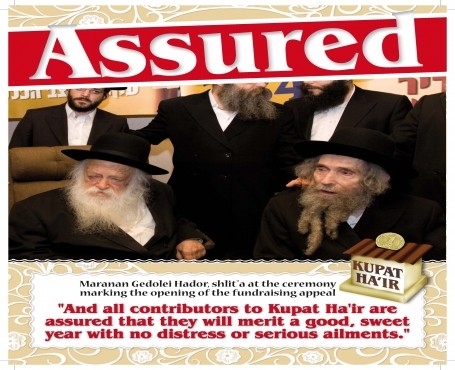In my view: Tzedaka wars — let the giver beware
Few industries are as low-risk and high-reward as the tzedaka industry. After all, there is little overhead, no merchandise to stock, a steady supply of customers, and customers pay cash without expecting anything in return.
It’s sure come a long way from the days when one of the more sophisticated strategies involved having a tag team of men with long peyos going to shul together to collect.
Rather than entering together, they would enter moments apart and start from different ends of the shul, maximizing their chances of double dipping. One could observe them together outside the shul before and after. Primitive, but surprisingly effective back in the day.
At some point people realized there was much more income to be had, and investing in partners could more than pay for itself. We started to see groups of collectors being driven around by “professional” drivers who knew the davening times in all the shuls and where to find the best profits. The driver took a hefty percentage, but the collectors profited as well from the arrangement.
Collectors from Israel — traveling to other countries to collect — hired these drivers to shuttle them to the private homes of those with a history of giving generously. It’s easier to buy with privacy on the Internet than it is to give tzedaka without having your name and address sold to mailing lists and questionable characters.
The tzedaka industry has become a lot more sophisticated and competitive in recent years thanks to new media and marketing techniques. Kupat Ha’ir has been the most successful in using rabbis as celebrity spokesmen. These marketing elements have always been present here and there, but Kupat Ha’ir brought it to a new level.
Even with the added cost of marketing, the overhead remains extremely low, and the customer still really receives nothing tangible beyond a tax deduction, and maybe a raffle ticket.
Va’ad Harabbanim L’inyanei Tzeduka, Inc. has emerged as the main competitor to Kupat Ha’ir. (And yes, they are an actual corporation.) They offer a range of prayers for sale and sold an autographed letter from their rabbonim. Western Wall Prayers has made a successful business out of Western Wall prayers. As a friend observed, the more you pay to support their Torah scholars, the more they promise to increase their “level of gratitude” and “increase our efforts to elicit divine assistance for you”.
The tzedaka marketplace is becoming increasingly more crowded, as competitors jockey for position and attempt to carve a niche for themselves. One of the main difficulties they face is distinguishing themselves from one another.
I frequent a bus stop at the Tzomet Shimshon highway intersection. There used to be two collection boxes at the bus stop. Now there are four collection boxes. Each one promises blessings and salvation. Kupat Ha’ir’s features a halachic ruling that your tzedaka money should go to them. Who would dare argue with that?
Others promise miraculous salvations. Are you going to ignore that? One advertises with a picture of a crying baby. How can you ignore that baby and still live with yourself? So which one deserves more coinage?
The tzedaka consumer has more choices than ever before, and a marketplace that is becoming increasingly crowded and confusing. My recommendation? Cut out the middlemen, tune out the bombastic promises, and do some homework to find truly needy families and individuals who deserve a helping hand. Give to them directly and discreetly. You won’t win a raffle. You won’t get the approval of some saintly-looking rabbi. You won’t even get a tax deduction. But you will have no better assurance that 100 percent of your money will go straight to someone who truly deserves it, and the mitzvah will be fulfilled in the best possible way. After all, this IS supposed to be a mitzvah, right? Not a purchase, not a desperate attempt to wrangle a miracle out of heaven, but a pure mitzvah of charity. Right?
That’s what I do, and I don’t regret one shekel. And I have no doubt that the One behind all blessings will not shortchange anyone who cuts out the middlemen, distributes his charity money with the greatest care and efficiency, doesn’t look for fringe benefits, and makes the world of giving just a little less commercialized.
Rabbi Chananya Weissman is the founder of EndTheMadness, a volunteer effort to rehabilitate the culture of the shidduch world and HotKiddush, a revolutionary networking site for the Orthodox Jewish population. Originally from New York, he lives in Jerusalem. He can be contacted at endthemadness@gmail.com.

 45.0°,
Mostly Cloudy
45.0°,
Mostly Cloudy 




